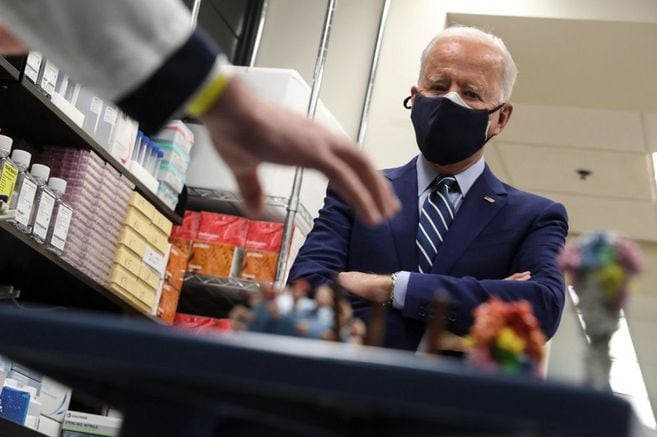
U.S. President Joe Biden signed two contracts on Thursday, each securing 100 million coronavirus vaccines for the country.
U.S. President Joe Biden announced Thursday that his government has closed deals to acquire an additional 200 million doses of vaccines against COVID-19.
“Just this afternoon, we signed final contracts for 100 million more Modern Laboratory doses and 100 million more Pfizer vaccines,” Biden said after touring the headquarters of the National Institutes of Health (NIH) near Washington.
The Biden administration said it was looking last month for such agreements, which would increase the U.S. stockpile of vaccines by 50 percent. With these doses, according to the president, the United States will have enough supply to vaccinate 300 million Americans by the end of July. Even more than that.
The US government has been one of the vaccine hoarders in the world, on the UK and Canada side. So far, accounts indicate that the United States, with a population of 328 million, is as follows:
- 300 million doses of Pfizer
- 300 million doses of Moderna (counting contracts on Thursday)
- 100 million doses of Johnson & Johnson (insured)
- 100 million doses of AstraZeneca (insured)
- 100 million doses of Novavax (insured)
- 100 million doses of Sanofi / GlaxoSmithKline (insured)
The U.S. vaccination campaign got off to an unstable start in December, but has since improved: at least 34.7 million people have already received one of two doses of immunization, about 10 percent of the population.
You may be interested in: Rich countries already have more vaccines than they need
In total, 46.3 million doses have already been applied and 68.2 million doses have already been distributed, according to official figures. Thousands of pharmacies were taking appointments on Thursday to start giving injections the next day.
The federal government has also used emergency legislation to increase vaccine production, opened massive vaccination sites in stadiums, and begun a separate program to reach neglected communities.
The coronavirus vaccine and geopolitics: playing with the health of citizens
But this news, positive for the United States, is not so good for the rest of the nations. According to estimates made by analyzing vaccine contracts, if all doses reached, the United States and the United Kingdom could vaccinate their populations up to four times. Canada would have the capacity to vaccinate its population up to six times.
Canada, in fact, received harsh criticism for its decision to receive 1.9 million vaccines from the COVID-19 Vaccine Global Access Facility, better known as the COVAX Mechanism, a global vaccine exchange initiative jointly coordinated by the World Health Organization, the Coalition for Innovations in Epidemic Preparedness and Gavi, the Vaccine Alliance.
- This is the only global mechanism for vaccine distribution and involves almost every country in the world (approximately 190 countries adhere to the mechanism). In COVAX, the richest countries subsidize access to vaccines to the poorest.
- And while all countries have the right to claim a dose of COVAX, Canada will be the only G7 member to do so. The other rich countries have chosen not to claim doses – at least in this wave of contagion – as they have ensured access to vaccines through other bilateral agreements.
- It should be noted that Canada has secured more doses of vaccines per capita than any other country in the world, which has increased criticism against it. Ottawa signed early purchase agreements with seven pharmacists ensuring the country has enough doses to vaccinate its population several times.
Competition is even between the rich countries themselves. London has secured more doses than it needs, while the rest of Europe has seen major supply problems. This has led to a slowdown in vaccination. seconds The times, Prime Minister Boris Johnson has considered handing over some of his vaccines to the neighborhood, but that decision has not yet been made. Rich countries have been told to share rather than accumulate, but this cooperation will always be determined on the terms they impose.
We recommend: Vaccines that will arrive in Colombia by COVAX mechanism are not ‘given away’
What we are seeing now are rich countries that buy most vaccines, even more than they need. But the core of the problem is deeper, or so the organization Médecins Sans Frontières (MSF) says in its latest report.
Its president for Latin America, the psychiatrist Germán Casas, assured El Espectador that vaccine patents, combined with their voracious commercialization, are the ones that will end up shaping a world that will violate the essence for which they were created: universal access to immunization. Now, if these were eliminated or sold at a low cost, poor or low-income countries would be able to produce the amount needed to permanently defeat the virus in a much shorter time than estimated.
You can read in depth how without vaccine patents we could beat the pandemic faster than the pandemic in this interview.
We recommend: Inequality in the world was evidenced in the pandemic
Now, this is the picture of deaths, infections and hospitalizations in the country most affected by the pandemic.
dead:
hospitalizations:
cases:
This is the vaccination schedule: